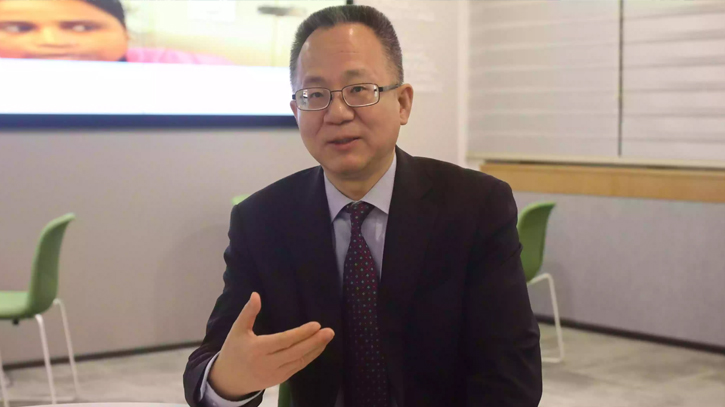
ADB Vice President Yingming Yang. Photo : Collected
Asian Development Bank (ADB) Vice President Yingming Yang has said Bangladesh is strategically located along major maritime routes, making it a potential hub for trade and transportation.
“We could see Bangladesh’s blue economy double in size in the next 10-15 years. With its extensive coastline along the Bay of Bengal, Bangladesh’s blue economy is critical for its overall growth,” he told the media in an interview, adding that Bangladesh is one of the world's largest producers of fish and shrimp.
The ADB vice president who is responsible for the management of the operations of ADB’s Central and West Asia Department and South Asia Department said, the development of ports, shipping infrastructure, and logistics is important for boosting economic activities related to maritime trade.
Harnessing renewable energy from offshore wind, waves and tides are also opportunities for the country, he said.
“Further, coastal areas offer significant potential for tourism development. Infrastructure development in coastal regions, along with sustainable tourism practices, is essential for maximizing the benefits of tourism,” said Yang who has over 30 years of experience in economic development, working on issues ranging from operations to policy making.
ADB can support Bangladesh in developing these aspects of its economy through its various funding modalities, as well as enabling appropriate policy action, he mentioned.
ADB is also developing new financing solutions such as the Natural Capital Fund and the Nature Solutions Finance Hub, that seek to provide as well as crowd-in capital to fund natural capital projects that include those in the blue economy, Yang said.
“We have also developed a $1.5 billion pipeline over the next 3 years, from 2025 to 2027, which will include aspects of the Blue Economy including coastal resilience, wetlands management and river system management,” he said.
Bangladesh is vulnerable to the impacts of climate change, including rising sea levels and extreme weather events.
“ADB’s support would also endeavor to build a sustainable blue economy that develops resilience and adaptation to climate change,” Yang said.
Responding to a question, he said ADB has an array of solutions to support Bangladesh. The Natural Capital Lab conducts natural capital assessments and accounting along with Stanford University, its Knowledge Partner, and can map the contributions of coastal ecosystems to economic growth.
These science-based methods can identify appropriate areas for investment in these ecosystems, ensuring that NbS are implemented at scale, Yang said.
Valuing nature also helps in supporting innovative financing mechanisms such as Payment for Ecosystem Services that hold immense potential.
The ADB vice president said they are consulting closely with its hh :partners, such as the Embassy of the Netherlands, International Fund for Agriculture Development and the World Bank to consider suitable partnering opportunities and building synergies.
The private sector will play a key role in leveraging opportunities catalyzed by sovereign financing support.
Explaining why the blue economy is important for Bangladesh, he said the blue economy benefits the country on multiple fronts - economic growth and employment, fisheries and aquaculture; shipping and port development; social importance; environmental and social benefits; and strategic national importance.
“It is crucial for Bangladesh, contributing significantly to GDP through sectors like fisheries, aquaculture, and shipping, while offering substantial employment opportunities across coastal regions,” Yang said.
Fisheries and aquaculture play a vital role in Bangladesh's Blue Economy, contributing to food security, employment, and export earnings.
“The sector employs over 1.3 million people and accounts for approximately 3.5% of the country's GDP. Bangladesh is one of the world's leading fish producing countries, with a total production of 4.38 million metric tons in 2019-20,” Yang said.
Bangladesh's maritime transport sector is crucial for facilitating international trade, with three major seaports - Chittagong, Mongla, and Payra - handling over 90% of the country's trade volume, he observed.
The sector plays a significant role in connecting Bangladesh to global markets and driving economic growth.
However, he said, there is a need for modernisation and efficiency improvements in port infrastructure and operations to enhance competitiveness and sustainability.
Bangladesh’s economy heavily relies on7 the readymade garment industry, employing approximately 4 million people, 60% of which are women, fueling the local economy, but such a single-source dependency poses risks, as seen in the recent COVID-19 pandemic hence the need for diversification of livelihoods, something the blue economy can provide through tourism, fishing and aquaculture.
In addition, coastal communities in Bangladesh have deep-rooted connections to the sea, through the fishing industry with maritime traditions shaping their livelihoods and cultural identity, Yang said.
Sustainable management of marine resources ensures the protection of biodiversity and helps combat the effects of climate change, while also supporting the livelihoods and welfare of around 35 million coastal inhabitants, he said.
Yang said Bangladesh’s government integrates the blue economy into national strategies, focusing on sustainable resource use, infrastructure development, and international collaboration to enhance economic security and environmental conservation.
Messenger/Sumon








